Personal and Managerial Effectiveness: An Analysis of Business Ethics
VerifiedAdded on 2023/06/09
|13
|3557
|212
Report
AI Summary
This report provides an overview of business ethics, its importance in organizational success, and the various ethical challenges that businesses face. It delves into the role of personal and professional ethics, the relationship between law and ethical principles, and the impact of ethical behavior on a company's performance and reputation. The report also discusses the advantages of ethical conduct, such as attracting consumers, retaining employees, and increasing shareholder value. Furthermore, it highlights the need for organizations to establish clear policies and guidelines to address ethical issues and promote a culture of integrity. The Texas Whistle Blower Act is mentioned as an example of legislation that protects employees who report unethical behavior. Desklib provides access to this report and other solved assignments for students.
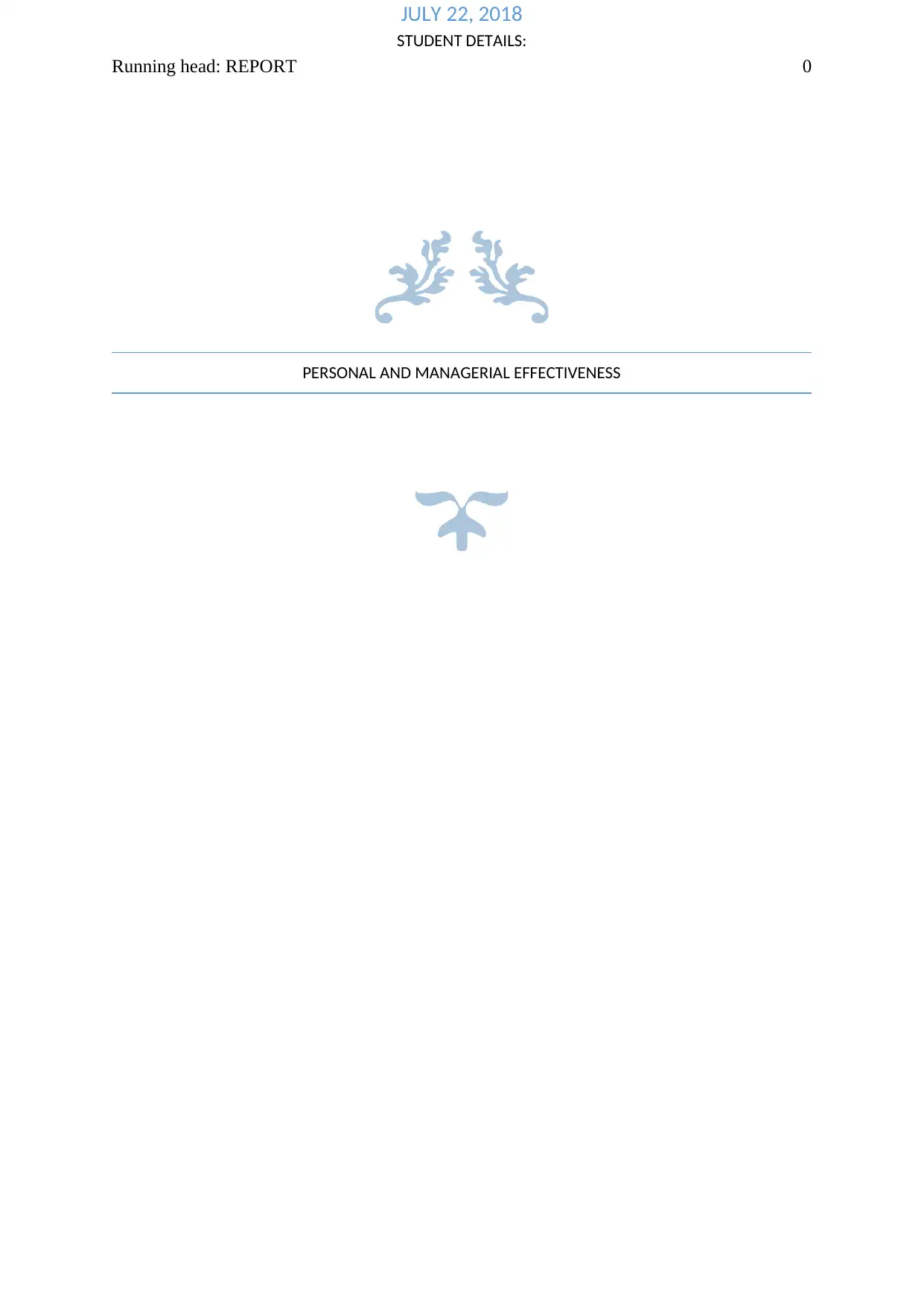
Running head: REPORT 0
PERSONAL AND MANAGERIAL EFFECTIVENESS
JULY 22, 2018
STUDENT DETAILS:
PERSONAL AND MANAGERIAL EFFECTIVENESS
JULY 22, 2018
STUDENT DETAILS:
Paraphrase This Document
Need a fresh take? Get an instant paraphrase of this document with our AI Paraphraser
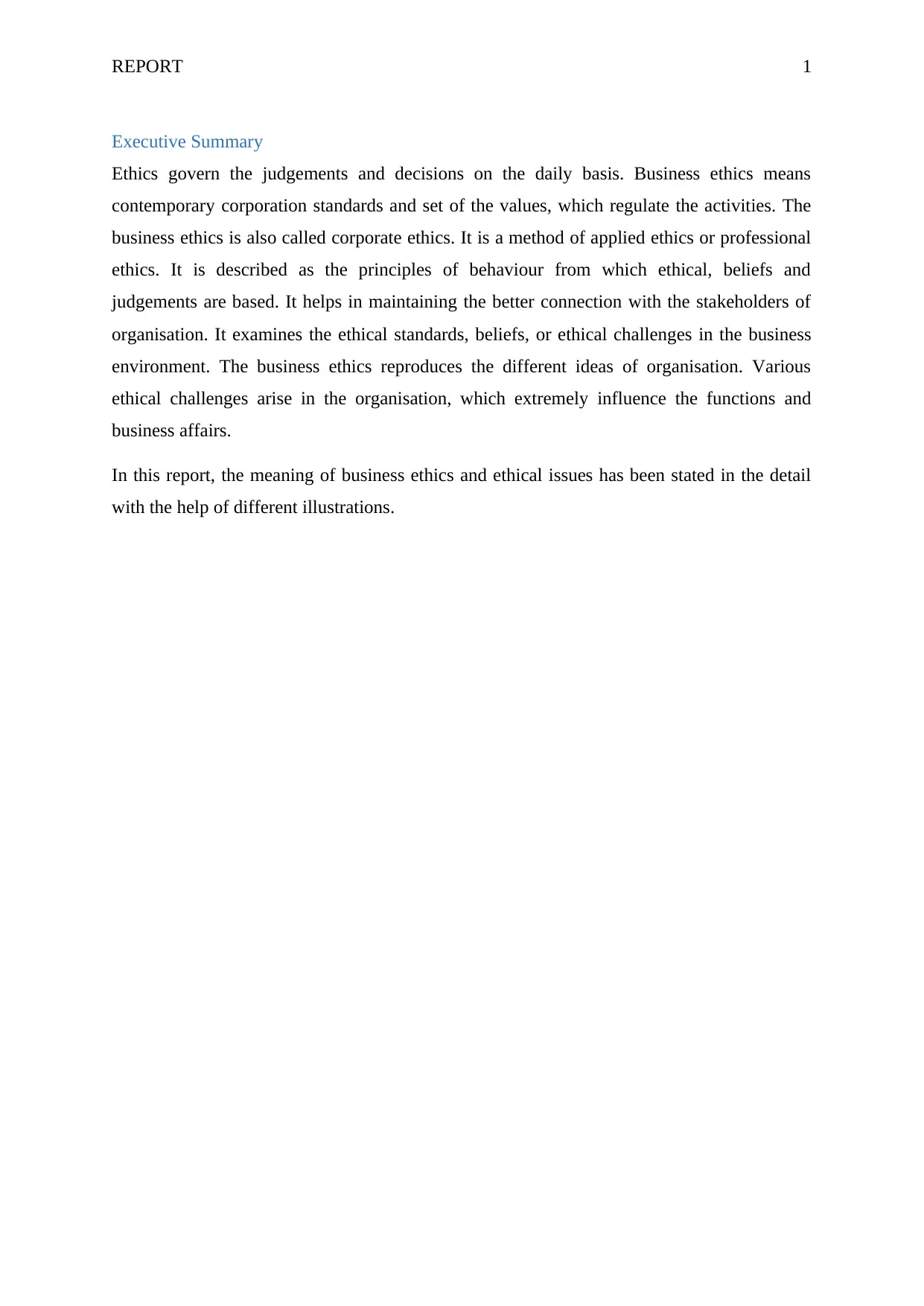
REPORT 1
Executive Summary
Ethics govern the judgements and decisions on the daily basis. Business ethics means
contemporary corporation standards and set of the values, which regulate the activities. The
business ethics is also called corporate ethics. It is a method of applied ethics or professional
ethics. It is described as the principles of behaviour from which ethical, beliefs and
judgements are based. It helps in maintaining the better connection with the stakeholders of
organisation. It examines the ethical standards, beliefs, or ethical challenges in the business
environment. The business ethics reproduces the different ideas of organisation. Various
ethical challenges arise in the organisation, which extremely influence the functions and
business affairs.
In this report, the meaning of business ethics and ethical issues has been stated in the detail
with the help of different illustrations.
Executive Summary
Ethics govern the judgements and decisions on the daily basis. Business ethics means
contemporary corporation standards and set of the values, which regulate the activities. The
business ethics is also called corporate ethics. It is a method of applied ethics or professional
ethics. It is described as the principles of behaviour from which ethical, beliefs and
judgements are based. It helps in maintaining the better connection with the stakeholders of
organisation. It examines the ethical standards, beliefs, or ethical challenges in the business
environment. The business ethics reproduces the different ideas of organisation. Various
ethical challenges arise in the organisation, which extremely influence the functions and
business affairs.
In this report, the meaning of business ethics and ethical issues has been stated in the detail
with the help of different illustrations.
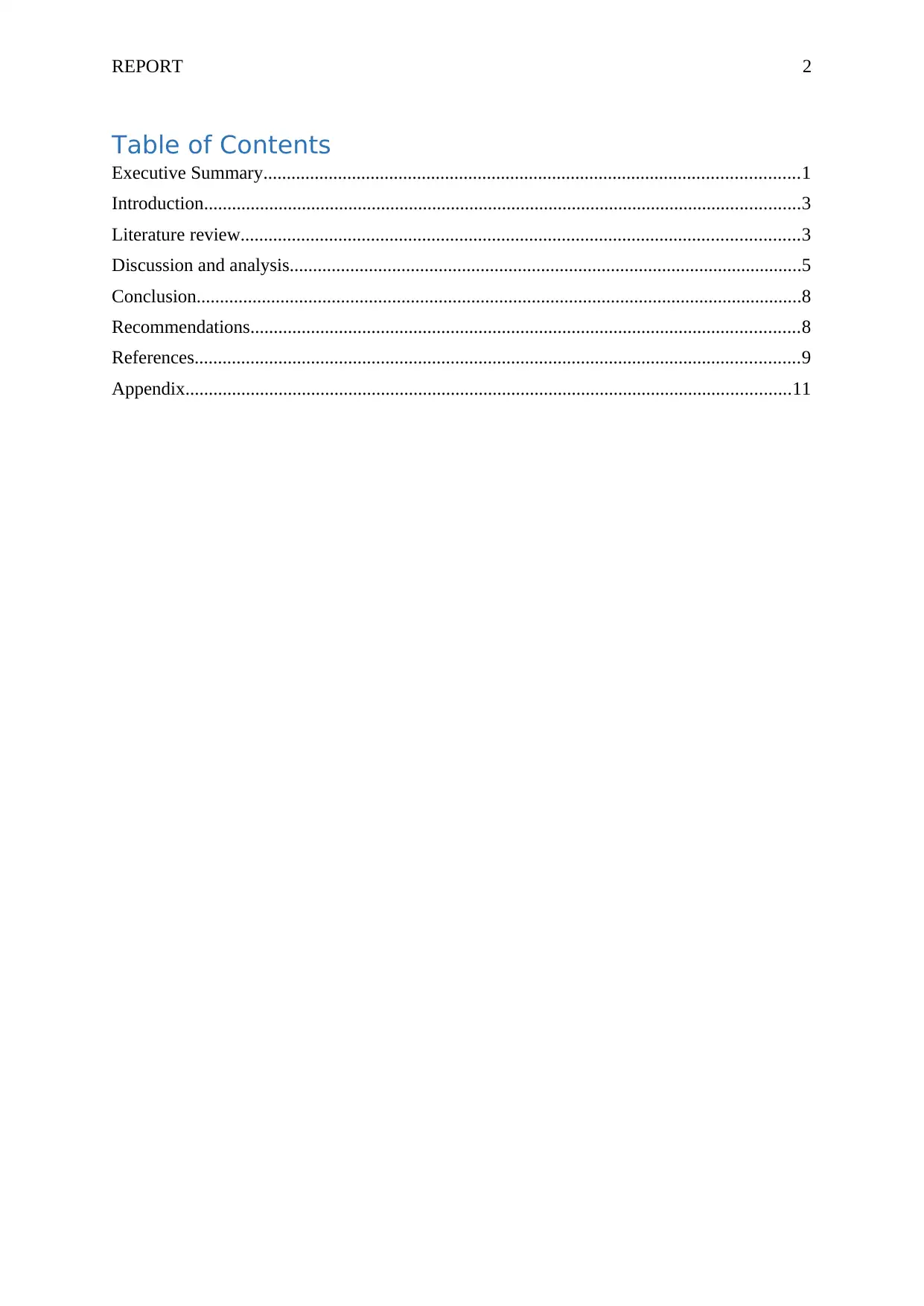
REPORT 2
Table of Contents
Executive Summary...................................................................................................................1
Introduction................................................................................................................................3
Literature review........................................................................................................................3
Discussion and analysis..............................................................................................................5
Conclusion..................................................................................................................................8
Recommendations......................................................................................................................8
References..................................................................................................................................9
Appendix..................................................................................................................................11
Table of Contents
Executive Summary...................................................................................................................1
Introduction................................................................................................................................3
Literature review........................................................................................................................3
Discussion and analysis..............................................................................................................5
Conclusion..................................................................................................................................8
Recommendations......................................................................................................................8
References..................................................................................................................................9
Appendix..................................................................................................................................11
⊘ This is a preview!⊘
Do you want full access?
Subscribe today to unlock all pages.

Trusted by 1+ million students worldwide
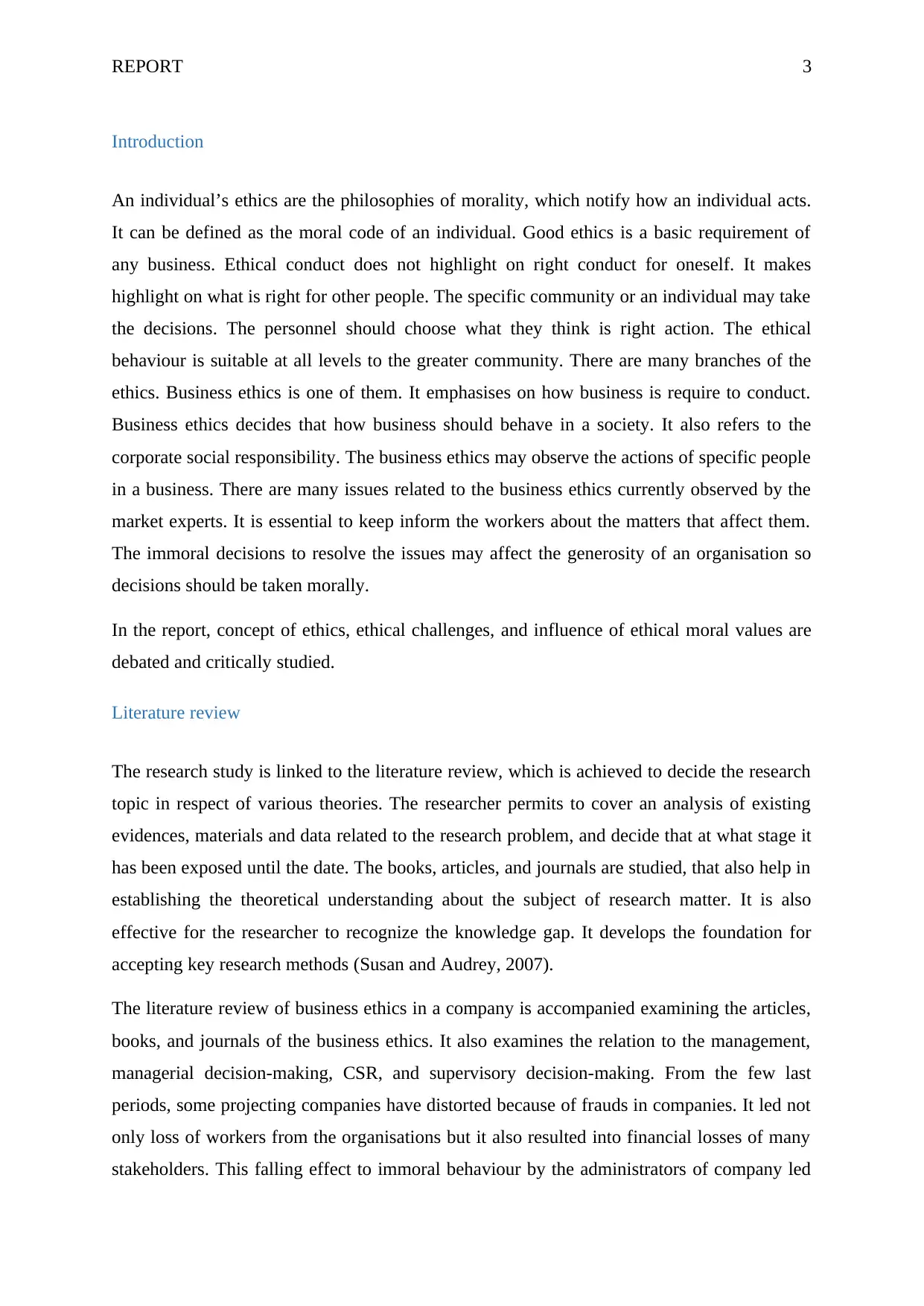
REPORT 3
Introduction
An individual’s ethics are the philosophies of morality, which notify how an individual acts.
It can be defined as the moral code of an individual. Good ethics is a basic requirement of
any business. Ethical conduct does not highlight on right conduct for oneself. It makes
highlight on what is right for other people. The specific community or an individual may take
the decisions. The personnel should choose what they think is right action. The ethical
behaviour is suitable at all levels to the greater community. There are many branches of the
ethics. Business ethics is one of them. It emphasises on how business is require to conduct.
Business ethics decides that how business should behave in a society. It also refers to the
corporate social responsibility. The business ethics may observe the actions of specific people
in a business. There are many issues related to the business ethics currently observed by the
market experts. It is essential to keep inform the workers about the matters that affect them.
The immoral decisions to resolve the issues may affect the generosity of an organisation so
decisions should be taken morally.
In the report, concept of ethics, ethical challenges, and influence of ethical moral values are
debated and critically studied.
Literature review
The research study is linked to the literature review, which is achieved to decide the research
topic in respect of various theories. The researcher permits to cover an analysis of existing
evidences, materials and data related to the research problem, and decide that at what stage it
has been exposed until the date. The books, articles, and journals are studied, that also help in
establishing the theoretical understanding about the subject of research matter. It is also
effective for the researcher to recognize the knowledge gap. It develops the foundation for
accepting key research methods (Susan and Audrey, 2007).
The literature review of business ethics in a company is accompanied examining the articles,
books, and journals of the business ethics. It also examines the relation to the management,
managerial decision-making, CSR, and supervisory decision-making. From the few last
periods, some projecting companies have distorted because of frauds in companies. It led not
only loss of workers from the organisations but it also resulted into financial losses of many
stakeholders. This falling effect to immoral behaviour by the administrators of company led
Introduction
An individual’s ethics are the philosophies of morality, which notify how an individual acts.
It can be defined as the moral code of an individual. Good ethics is a basic requirement of
any business. Ethical conduct does not highlight on right conduct for oneself. It makes
highlight on what is right for other people. The specific community or an individual may take
the decisions. The personnel should choose what they think is right action. The ethical
behaviour is suitable at all levels to the greater community. There are many branches of the
ethics. Business ethics is one of them. It emphasises on how business is require to conduct.
Business ethics decides that how business should behave in a society. It also refers to the
corporate social responsibility. The business ethics may observe the actions of specific people
in a business. There are many issues related to the business ethics currently observed by the
market experts. It is essential to keep inform the workers about the matters that affect them.
The immoral decisions to resolve the issues may affect the generosity of an organisation so
decisions should be taken morally.
In the report, concept of ethics, ethical challenges, and influence of ethical moral values are
debated and critically studied.
Literature review
The research study is linked to the literature review, which is achieved to decide the research
topic in respect of various theories. The researcher permits to cover an analysis of existing
evidences, materials and data related to the research problem, and decide that at what stage it
has been exposed until the date. The books, articles, and journals are studied, that also help in
establishing the theoretical understanding about the subject of research matter. It is also
effective for the researcher to recognize the knowledge gap. It develops the foundation for
accepting key research methods (Susan and Audrey, 2007).
The literature review of business ethics in a company is accompanied examining the articles,
books, and journals of the business ethics. It also examines the relation to the management,
managerial decision-making, CSR, and supervisory decision-making. From the few last
periods, some projecting companies have distorted because of frauds in companies. It led not
only loss of workers from the organisations but it also resulted into financial losses of many
stakeholders. This falling effect to immoral behaviour by the administrators of company led
Paraphrase This Document
Need a fresh take? Get an instant paraphrase of this document with our AI Paraphraser
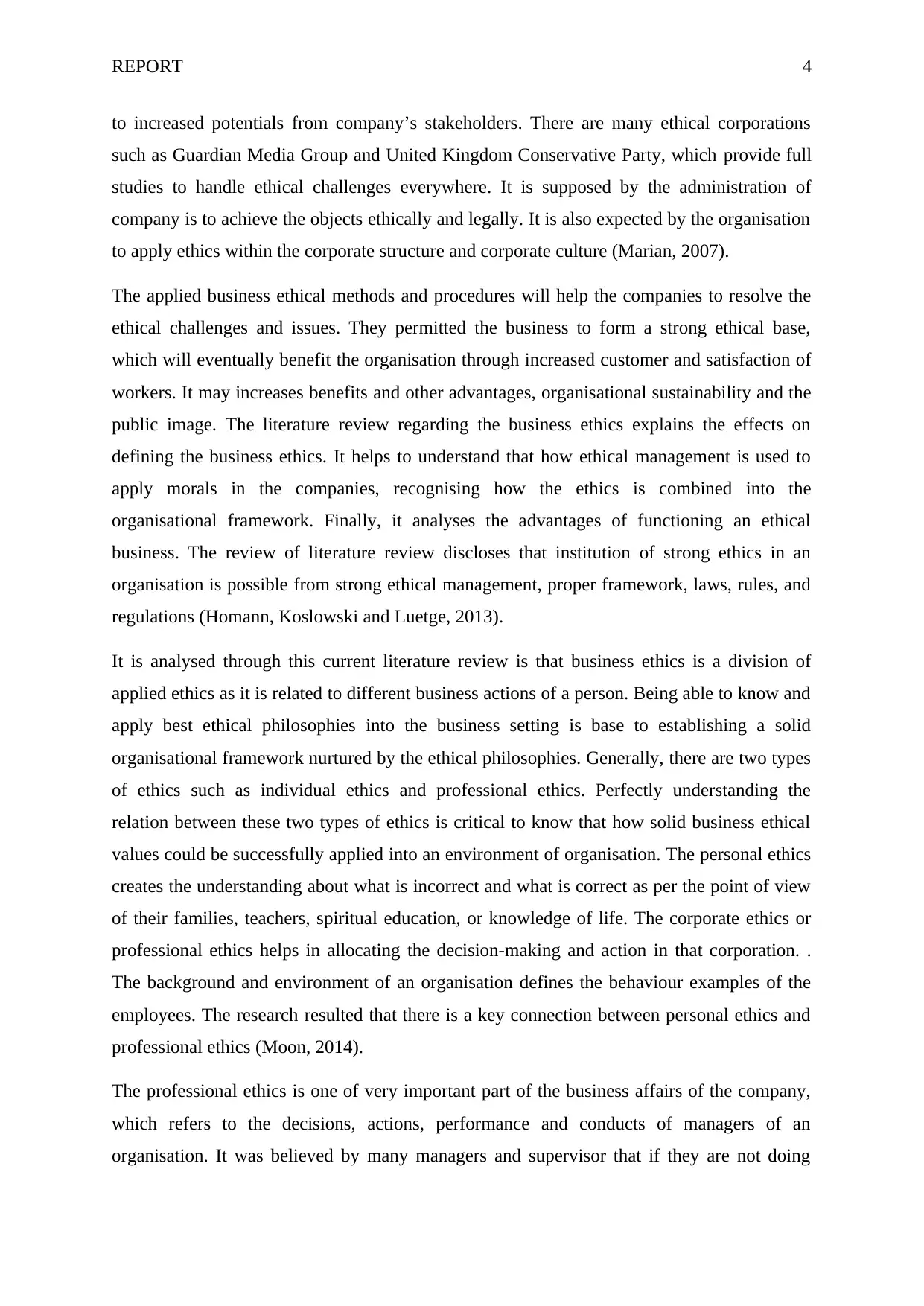
REPORT 4
to increased potentials from company’s stakeholders. There are many ethical corporations
such as Guardian Media Group and United Kingdom Conservative Party, which provide full
studies to handle ethical challenges everywhere. It is supposed by the administration of
company is to achieve the objects ethically and legally. It is also expected by the organisation
to apply ethics within the corporate structure and corporate culture (Marian, 2007).
The applied business ethical methods and procedures will help the companies to resolve the
ethical challenges and issues. They permitted the business to form a strong ethical base,
which will eventually benefit the organisation through increased customer and satisfaction of
workers. It may increases benefits and other advantages, organisational sustainability and the
public image. The literature review regarding the business ethics explains the effects on
defining the business ethics. It helps to understand that how ethical management is used to
apply morals in the companies, recognising how the ethics is combined into the
organisational framework. Finally, it analyses the advantages of functioning an ethical
business. The review of literature review discloses that institution of strong ethics in an
organisation is possible from strong ethical management, proper framework, laws, rules, and
regulations (Homann, Koslowski and Luetge, 2013).
It is analysed through this current literature review is that business ethics is a division of
applied ethics as it is related to different business actions of a person. Being able to know and
apply best ethical philosophies into the business setting is base to establishing a solid
organisational framework nurtured by the ethical philosophies. Generally, there are two types
of ethics such as individual ethics and professional ethics. Perfectly understanding the
relation between these two types of ethics is critical to know that how solid business ethical
values could be successfully applied into an environment of organisation. The personal ethics
creates the understanding about what is incorrect and what is correct as per the point of view
of their families, teachers, spiritual education, or knowledge of life. The corporate ethics or
professional ethics helps in allocating the decision-making and action in that corporation. .
The background and environment of an organisation defines the behaviour examples of the
employees. The research resulted that there is a key connection between personal ethics and
professional ethics (Moon, 2014).
The professional ethics is one of very important part of the business affairs of the company,
which refers to the decisions, actions, performance and conducts of managers of an
organisation. It was believed by many managers and supervisor that if they are not doing
to increased potentials from company’s stakeholders. There are many ethical corporations
such as Guardian Media Group and United Kingdom Conservative Party, which provide full
studies to handle ethical challenges everywhere. It is supposed by the administration of
company is to achieve the objects ethically and legally. It is also expected by the organisation
to apply ethics within the corporate structure and corporate culture (Marian, 2007).
The applied business ethical methods and procedures will help the companies to resolve the
ethical challenges and issues. They permitted the business to form a strong ethical base,
which will eventually benefit the organisation through increased customer and satisfaction of
workers. It may increases benefits and other advantages, organisational sustainability and the
public image. The literature review regarding the business ethics explains the effects on
defining the business ethics. It helps to understand that how ethical management is used to
apply morals in the companies, recognising how the ethics is combined into the
organisational framework. Finally, it analyses the advantages of functioning an ethical
business. The review of literature review discloses that institution of strong ethics in an
organisation is possible from strong ethical management, proper framework, laws, rules, and
regulations (Homann, Koslowski and Luetge, 2013).
It is analysed through this current literature review is that business ethics is a division of
applied ethics as it is related to different business actions of a person. Being able to know and
apply best ethical philosophies into the business setting is base to establishing a solid
organisational framework nurtured by the ethical philosophies. Generally, there are two types
of ethics such as individual ethics and professional ethics. Perfectly understanding the
relation between these two types of ethics is critical to know that how solid business ethical
values could be successfully applied into an environment of organisation. The personal ethics
creates the understanding about what is incorrect and what is correct as per the point of view
of their families, teachers, spiritual education, or knowledge of life. The corporate ethics or
professional ethics helps in allocating the decision-making and action in that corporation. .
The background and environment of an organisation defines the behaviour examples of the
employees. The research resulted that there is a key connection between personal ethics and
professional ethics (Moon, 2014).
The professional ethics is one of very important part of the business affairs of the company,
which refers to the decisions, actions, performance and conducts of managers of an
organisation. It was believed by many managers and supervisor that if they are not doing
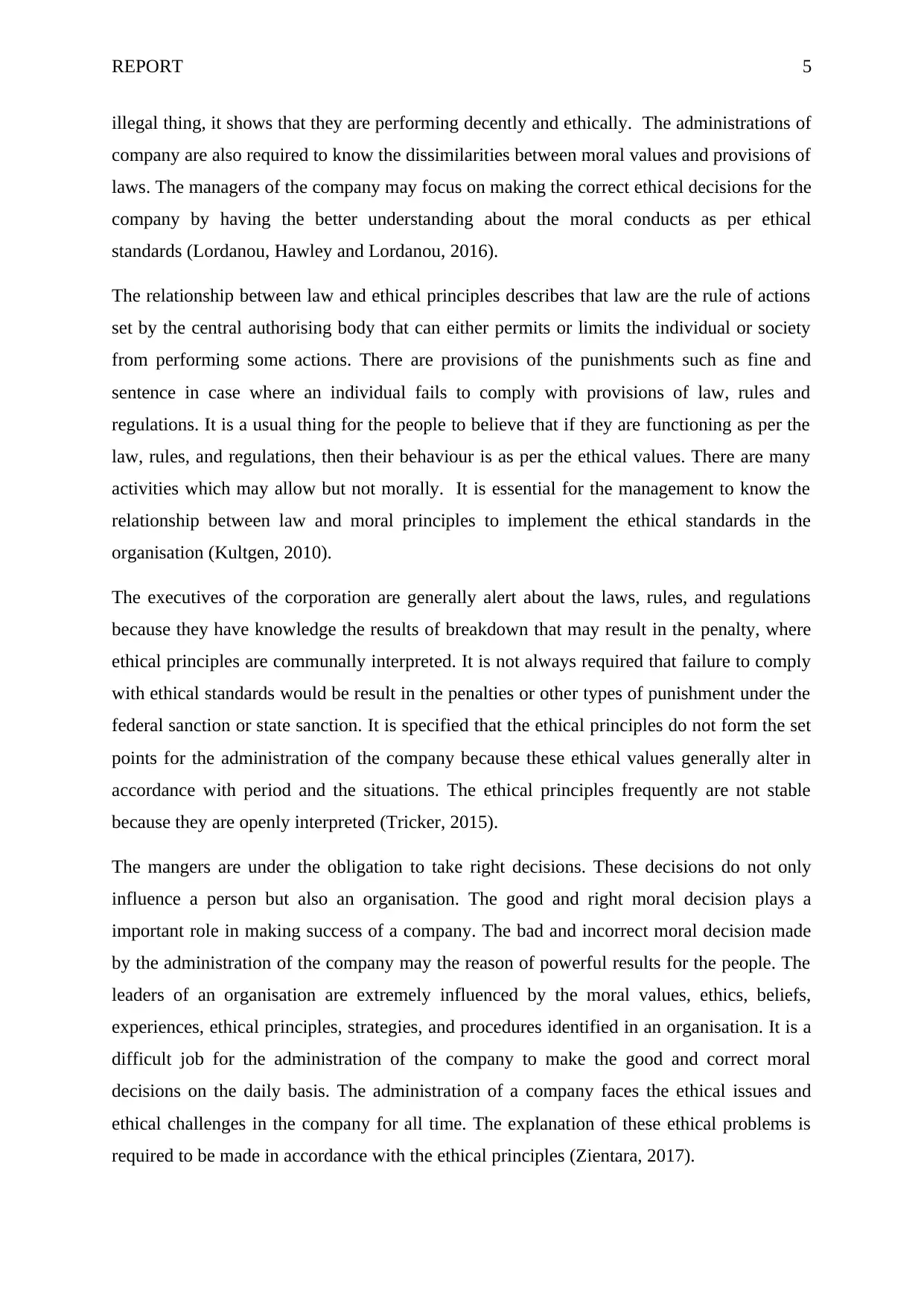
REPORT 5
illegal thing, it shows that they are performing decently and ethically. The administrations of
company are also required to know the dissimilarities between moral values and provisions of
laws. The managers of the company may focus on making the correct ethical decisions for the
company by having the better understanding about the moral conducts as per ethical
standards (Lordanou, Hawley and Lordanou, 2016).
The relationship between law and ethical principles describes that law are the rule of actions
set by the central authorising body that can either permits or limits the individual or society
from performing some actions. There are provisions of the punishments such as fine and
sentence in case where an individual fails to comply with provisions of law, rules and
regulations. It is a usual thing for the people to believe that if they are functioning as per the
law, rules, and regulations, then their behaviour is as per the ethical values. There are many
activities which may allow but not morally. It is essential for the management to know the
relationship between law and moral principles to implement the ethical standards in the
organisation (Kultgen, 2010).
The executives of the corporation are generally alert about the laws, rules, and regulations
because they have knowledge the results of breakdown that may result in the penalty, where
ethical principles are communally interpreted. It is not always required that failure to comply
with ethical standards would be result in the penalties or other types of punishment under the
federal sanction or state sanction. It is specified that the ethical principles do not form the set
points for the administration of the company because these ethical values generally alter in
accordance with period and the situations. The ethical principles frequently are not stable
because they are openly interpreted (Tricker, 2015).
The mangers are under the obligation to take right decisions. These decisions do not only
influence a person but also an organisation. The good and right moral decision plays a
important role in making success of a company. The bad and incorrect moral decision made
by the administration of the company may the reason of powerful results for the people. The
leaders of an organisation are extremely influenced by the moral values, ethics, beliefs,
experiences, ethical principles, strategies, and procedures identified in an organisation. It is a
difficult job for the administration of the company to make the good and correct moral
decisions on the daily basis. The administration of a company faces the ethical issues and
ethical challenges in the company for all time. The explanation of these ethical problems is
required to be made in accordance with the ethical principles (Zientara, 2017).
illegal thing, it shows that they are performing decently and ethically. The administrations of
company are also required to know the dissimilarities between moral values and provisions of
laws. The managers of the company may focus on making the correct ethical decisions for the
company by having the better understanding about the moral conducts as per ethical
standards (Lordanou, Hawley and Lordanou, 2016).
The relationship between law and ethical principles describes that law are the rule of actions
set by the central authorising body that can either permits or limits the individual or society
from performing some actions. There are provisions of the punishments such as fine and
sentence in case where an individual fails to comply with provisions of law, rules and
regulations. It is a usual thing for the people to believe that if they are functioning as per the
law, rules, and regulations, then their behaviour is as per the ethical values. There are many
activities which may allow but not morally. It is essential for the management to know the
relationship between law and moral principles to implement the ethical standards in the
organisation (Kultgen, 2010).
The executives of the corporation are generally alert about the laws, rules, and regulations
because they have knowledge the results of breakdown that may result in the penalty, where
ethical principles are communally interpreted. It is not always required that failure to comply
with ethical standards would be result in the penalties or other types of punishment under the
federal sanction or state sanction. It is specified that the ethical principles do not form the set
points for the administration of the company because these ethical values generally alter in
accordance with period and the situations. The ethical principles frequently are not stable
because they are openly interpreted (Tricker, 2015).
The mangers are under the obligation to take right decisions. These decisions do not only
influence a person but also an organisation. The good and right moral decision plays a
important role in making success of a company. The bad and incorrect moral decision made
by the administration of the company may the reason of powerful results for the people. The
leaders of an organisation are extremely influenced by the moral values, ethics, beliefs,
experiences, ethical principles, strategies, and procedures identified in an organisation. It is a
difficult job for the administration of the company to make the good and correct moral
decisions on the daily basis. The administration of a company faces the ethical issues and
ethical challenges in the company for all time. The explanation of these ethical problems is
required to be made in accordance with the ethical principles (Zientara, 2017).
⊘ This is a preview!⊘
Do you want full access?
Subscribe today to unlock all pages.

Trusted by 1+ million students worldwide
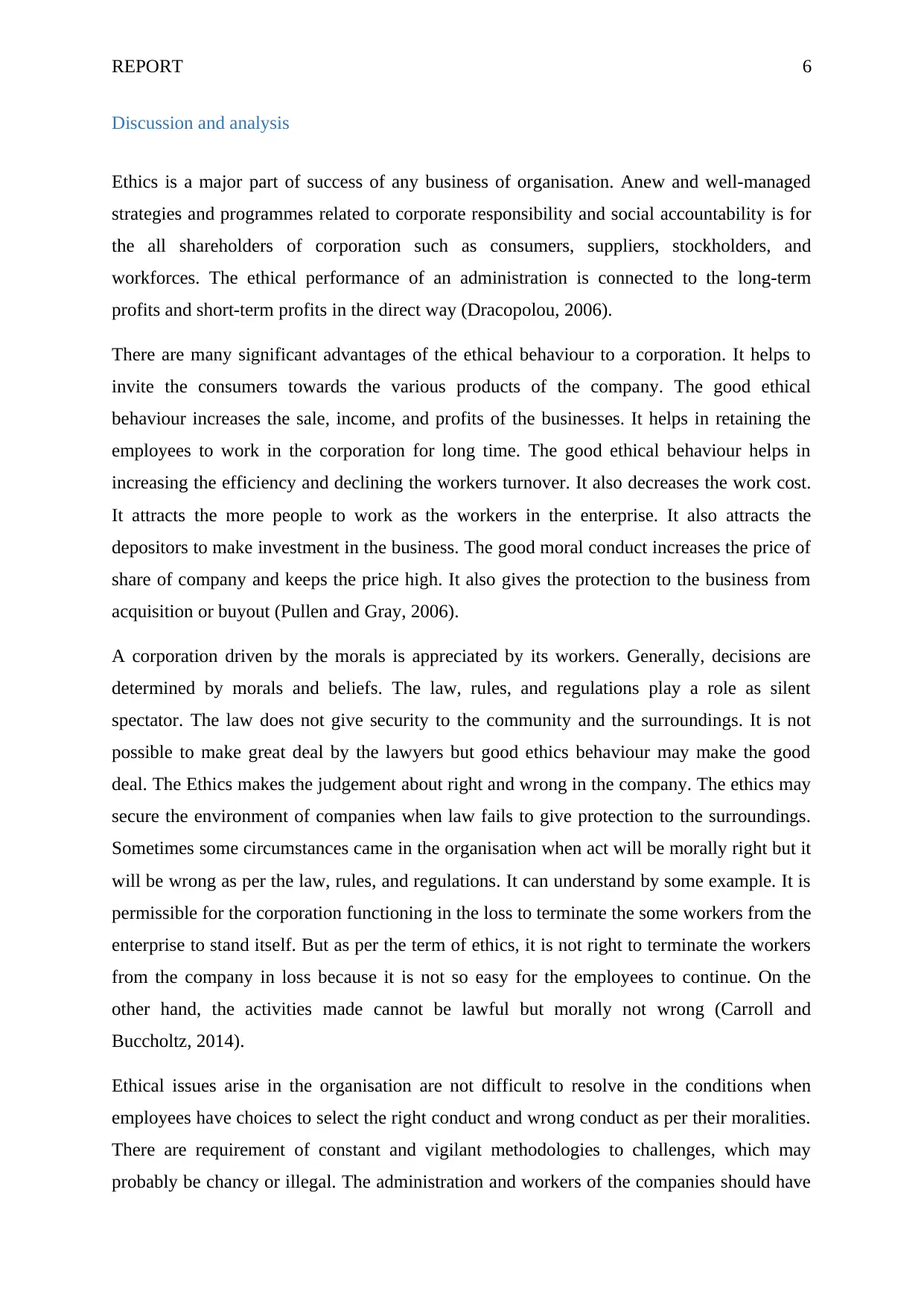
REPORT 6
Discussion and analysis
Ethics is a major part of success of any business of organisation. Anew and well-managed
strategies and programmes related to corporate responsibility and social accountability is for
the all shareholders of corporation such as consumers, suppliers, stockholders, and
workforces. The ethical performance of an administration is connected to the long-term
profits and short-term profits in the direct way (Dracopolou, 2006).
There are many significant advantages of the ethical behaviour to a corporation. It helps to
invite the consumers towards the various products of the company. The good ethical
behaviour increases the sale, income, and profits of the businesses. It helps in retaining the
employees to work in the corporation for long time. The good ethical behaviour helps in
increasing the efficiency and declining the workers turnover. It also decreases the work cost.
It attracts the more people to work as the workers in the enterprise. It also attracts the
depositors to make investment in the business. The good moral conduct increases the price of
share of company and keeps the price high. It also gives the protection to the business from
acquisition or buyout (Pullen and Gray, 2006).
A corporation driven by the morals is appreciated by its workers. Generally, decisions are
determined by morals and beliefs. The law, rules, and regulations play a role as silent
spectator. The law does not give security to the community and the surroundings. It is not
possible to make great deal by the lawyers but good ethics behaviour may make the good
deal. The Ethics makes the judgement about right and wrong in the company. The ethics may
secure the environment of companies when law fails to give protection to the surroundings.
Sometimes some circumstances came in the organisation when act will be morally right but it
will be wrong as per the law, rules, and regulations. It can understand by some example. It is
permissible for the corporation functioning in the loss to terminate the some workers from the
enterprise to stand itself. But as per the term of ethics, it is not right to terminate the workers
from the company in loss because it is not so easy for the employees to continue. On the
other hand, the activities made cannot be lawful but morally not wrong (Carroll and
Buccholtz, 2014).
Ethical issues arise in the organisation are not difficult to resolve in the conditions when
employees have choices to select the right conduct and wrong conduct as per their moralities.
There are requirement of constant and vigilant methodologies to challenges, which may
probably be chancy or illegal. The administration and workers of the companies should have
Discussion and analysis
Ethics is a major part of success of any business of organisation. Anew and well-managed
strategies and programmes related to corporate responsibility and social accountability is for
the all shareholders of corporation such as consumers, suppliers, stockholders, and
workforces. The ethical performance of an administration is connected to the long-term
profits and short-term profits in the direct way (Dracopolou, 2006).
There are many significant advantages of the ethical behaviour to a corporation. It helps to
invite the consumers towards the various products of the company. The good ethical
behaviour increases the sale, income, and profits of the businesses. It helps in retaining the
employees to work in the corporation for long time. The good ethical behaviour helps in
increasing the efficiency and declining the workers turnover. It also decreases the work cost.
It attracts the more people to work as the workers in the enterprise. It also attracts the
depositors to make investment in the business. The good moral conduct increases the price of
share of company and keeps the price high. It also gives the protection to the business from
acquisition or buyout (Pullen and Gray, 2006).
A corporation driven by the morals is appreciated by its workers. Generally, decisions are
determined by morals and beliefs. The law, rules, and regulations play a role as silent
spectator. The law does not give security to the community and the surroundings. It is not
possible to make great deal by the lawyers but good ethics behaviour may make the good
deal. The Ethics makes the judgement about right and wrong in the company. The ethics may
secure the environment of companies when law fails to give protection to the surroundings.
Sometimes some circumstances came in the organisation when act will be morally right but it
will be wrong as per the law, rules, and regulations. It can understand by some example. It is
permissible for the corporation functioning in the loss to terminate the some workers from the
enterprise to stand itself. But as per the term of ethics, it is not right to terminate the workers
from the company in loss because it is not so easy for the employees to continue. On the
other hand, the activities made cannot be lawful but morally not wrong (Carroll and
Buccholtz, 2014).
Ethical issues arise in the organisation are not difficult to resolve in the conditions when
employees have choices to select the right conduct and wrong conduct as per their moralities.
There are requirement of constant and vigilant methodologies to challenges, which may
probably be chancy or illegal. The administration and workers of the companies should have
Paraphrase This Document
Need a fresh take? Get an instant paraphrase of this document with our AI Paraphraser
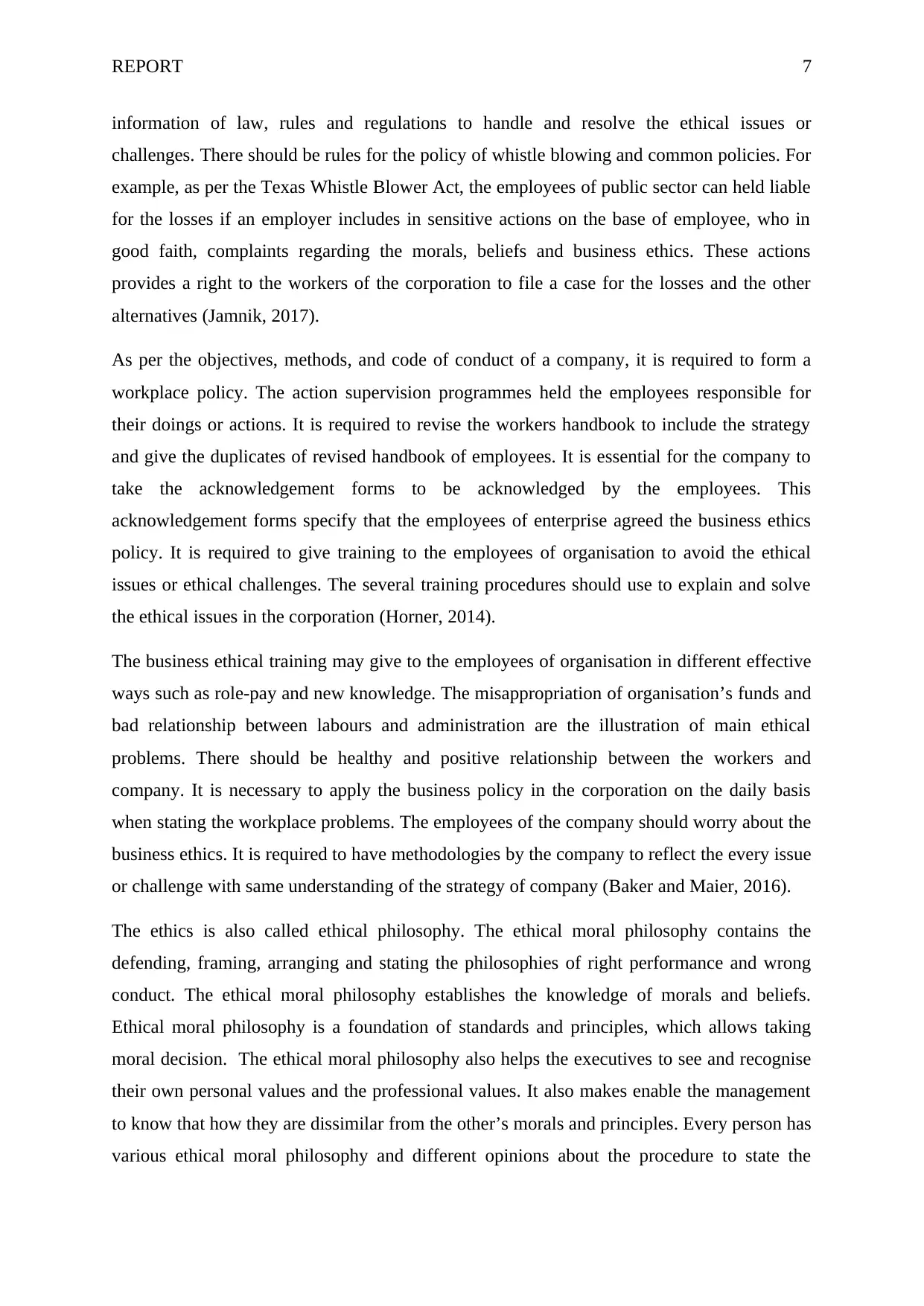
REPORT 7
information of law, rules and regulations to handle and resolve the ethical issues or
challenges. There should be rules for the policy of whistle blowing and common policies. For
example, as per the Texas Whistle Blower Act, the employees of public sector can held liable
for the losses if an employer includes in sensitive actions on the base of employee, who in
good faith, complaints regarding the morals, beliefs and business ethics. These actions
provides a right to the workers of the corporation to file a case for the losses and the other
alternatives (Jamnik, 2017).
As per the objectives, methods, and code of conduct of a company, it is required to form a
workplace policy. The action supervision programmes held the employees responsible for
their doings or actions. It is required to revise the workers handbook to include the strategy
and give the duplicates of revised handbook of employees. It is essential for the company to
take the acknowledgement forms to be acknowledged by the employees. This
acknowledgement forms specify that the employees of enterprise agreed the business ethics
policy. It is required to give training to the employees of organisation to avoid the ethical
issues or ethical challenges. The several training procedures should use to explain and solve
the ethical issues in the corporation (Horner, 2014).
The business ethical training may give to the employees of organisation in different effective
ways such as role-pay and new knowledge. The misappropriation of organisation’s funds and
bad relationship between labours and administration are the illustration of main ethical
problems. There should be healthy and positive relationship between the workers and
company. It is necessary to apply the business policy in the corporation on the daily basis
when stating the workplace problems. The employees of the company should worry about the
business ethics. It is required to have methodologies by the company to reflect the every issue
or challenge with same understanding of the strategy of company (Baker and Maier, 2016).
The ethics is also called ethical philosophy. The ethical moral philosophy contains the
defending, framing, arranging and stating the philosophies of right performance and wrong
conduct. The ethical moral philosophy establishes the knowledge of morals and beliefs.
Ethical moral philosophy is a foundation of standards and principles, which allows taking
moral decision. The ethical moral philosophy also helps the executives to see and recognise
their own personal values and the professional values. It also makes enable the management
to know that how they are dissimilar from the other’s morals and principles. Every person has
various ethical moral philosophy and different opinions about the procedure to state the
information of law, rules and regulations to handle and resolve the ethical issues or
challenges. There should be rules for the policy of whistle blowing and common policies. For
example, as per the Texas Whistle Blower Act, the employees of public sector can held liable
for the losses if an employer includes in sensitive actions on the base of employee, who in
good faith, complaints regarding the morals, beliefs and business ethics. These actions
provides a right to the workers of the corporation to file a case for the losses and the other
alternatives (Jamnik, 2017).
As per the objectives, methods, and code of conduct of a company, it is required to form a
workplace policy. The action supervision programmes held the employees responsible for
their doings or actions. It is required to revise the workers handbook to include the strategy
and give the duplicates of revised handbook of employees. It is essential for the company to
take the acknowledgement forms to be acknowledged by the employees. This
acknowledgement forms specify that the employees of enterprise agreed the business ethics
policy. It is required to give training to the employees of organisation to avoid the ethical
issues or ethical challenges. The several training procedures should use to explain and solve
the ethical issues in the corporation (Horner, 2014).
The business ethical training may give to the employees of organisation in different effective
ways such as role-pay and new knowledge. The misappropriation of organisation’s funds and
bad relationship between labours and administration are the illustration of main ethical
problems. There should be healthy and positive relationship between the workers and
company. It is necessary to apply the business policy in the corporation on the daily basis
when stating the workplace problems. The employees of the company should worry about the
business ethics. It is required to have methodologies by the company to reflect the every issue
or challenge with same understanding of the strategy of company (Baker and Maier, 2016).
The ethics is also called ethical philosophy. The ethical moral philosophy contains the
defending, framing, arranging and stating the philosophies of right performance and wrong
conduct. The ethical moral philosophy establishes the knowledge of morals and beliefs.
Ethical moral philosophy is a foundation of standards and principles, which allows taking
moral decision. The ethical moral philosophy also helps the executives to see and recognise
their own personal values and the professional values. It also makes enable the management
to know that how they are dissimilar from the other’s morals and principles. Every person has
various ethical moral philosophy and different opinions about the procedure to state the
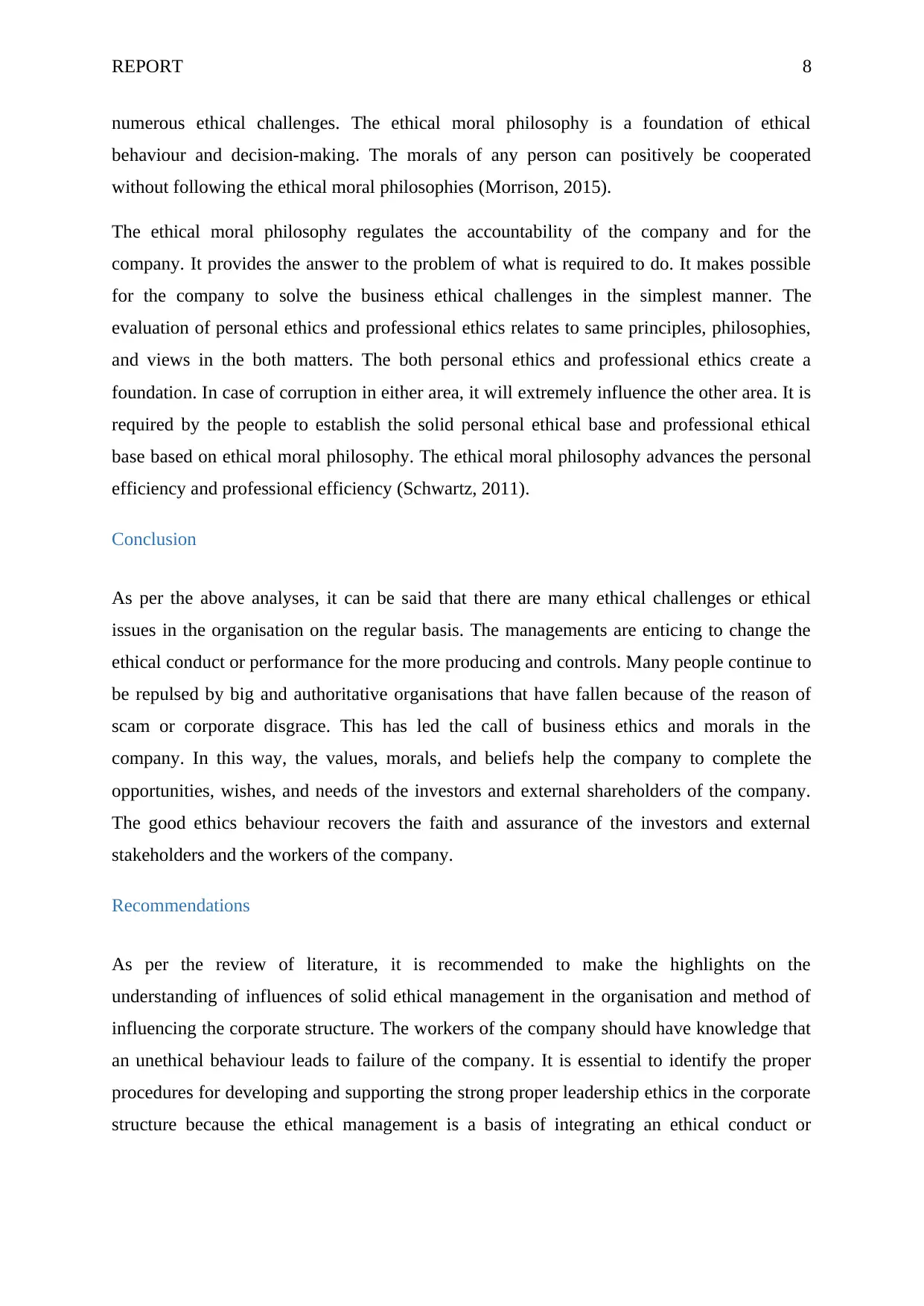
REPORT 8
numerous ethical challenges. The ethical moral philosophy is a foundation of ethical
behaviour and decision-making. The morals of any person can positively be cooperated
without following the ethical moral philosophies (Morrison, 2015).
The ethical moral philosophy regulates the accountability of the company and for the
company. It provides the answer to the problem of what is required to do. It makes possible
for the company to solve the business ethical challenges in the simplest manner. The
evaluation of personal ethics and professional ethics relates to same principles, philosophies,
and views in the both matters. The both personal ethics and professional ethics create a
foundation. In case of corruption in either area, it will extremely influence the other area. It is
required by the people to establish the solid personal ethical base and professional ethical
base based on ethical moral philosophy. The ethical moral philosophy advances the personal
efficiency and professional efficiency (Schwartz, 2011).
Conclusion
As per the above analyses, it can be said that there are many ethical challenges or ethical
issues in the organisation on the regular basis. The managements are enticing to change the
ethical conduct or performance for the more producing and controls. Many people continue to
be repulsed by big and authoritative organisations that have fallen because of the reason of
scam or corporate disgrace. This has led the call of business ethics and morals in the
company. In this way, the values, morals, and beliefs help the company to complete the
opportunities, wishes, and needs of the investors and external shareholders of the company.
The good ethics behaviour recovers the faith and assurance of the investors and external
stakeholders and the workers of the company.
Recommendations
As per the review of literature, it is recommended to make the highlights on the
understanding of influences of solid ethical management in the organisation and method of
influencing the corporate structure. The workers of the company should have knowledge that
an unethical behaviour leads to failure of the company. It is essential to identify the proper
procedures for developing and supporting the strong proper leadership ethics in the corporate
structure because the ethical management is a basis of integrating an ethical conduct or
numerous ethical challenges. The ethical moral philosophy is a foundation of ethical
behaviour and decision-making. The morals of any person can positively be cooperated
without following the ethical moral philosophies (Morrison, 2015).
The ethical moral philosophy regulates the accountability of the company and for the
company. It provides the answer to the problem of what is required to do. It makes possible
for the company to solve the business ethical challenges in the simplest manner. The
evaluation of personal ethics and professional ethics relates to same principles, philosophies,
and views in the both matters. The both personal ethics and professional ethics create a
foundation. In case of corruption in either area, it will extremely influence the other area. It is
required by the people to establish the solid personal ethical base and professional ethical
base based on ethical moral philosophy. The ethical moral philosophy advances the personal
efficiency and professional efficiency (Schwartz, 2011).
Conclusion
As per the above analyses, it can be said that there are many ethical challenges or ethical
issues in the organisation on the regular basis. The managements are enticing to change the
ethical conduct or performance for the more producing and controls. Many people continue to
be repulsed by big and authoritative organisations that have fallen because of the reason of
scam or corporate disgrace. This has led the call of business ethics and morals in the
company. In this way, the values, morals, and beliefs help the company to complete the
opportunities, wishes, and needs of the investors and external shareholders of the company.
The good ethics behaviour recovers the faith and assurance of the investors and external
stakeholders and the workers of the company.
Recommendations
As per the review of literature, it is recommended to make the highlights on the
understanding of influences of solid ethical management in the organisation and method of
influencing the corporate structure. The workers of the company should have knowledge that
an unethical behaviour leads to failure of the company. It is essential to identify the proper
procedures for developing and supporting the strong proper leadership ethics in the corporate
structure because the ethical management is a basis of integrating an ethical conduct or
⊘ This is a preview!⊘
Do you want full access?
Subscribe today to unlock all pages.

Trusted by 1+ million students worldwide
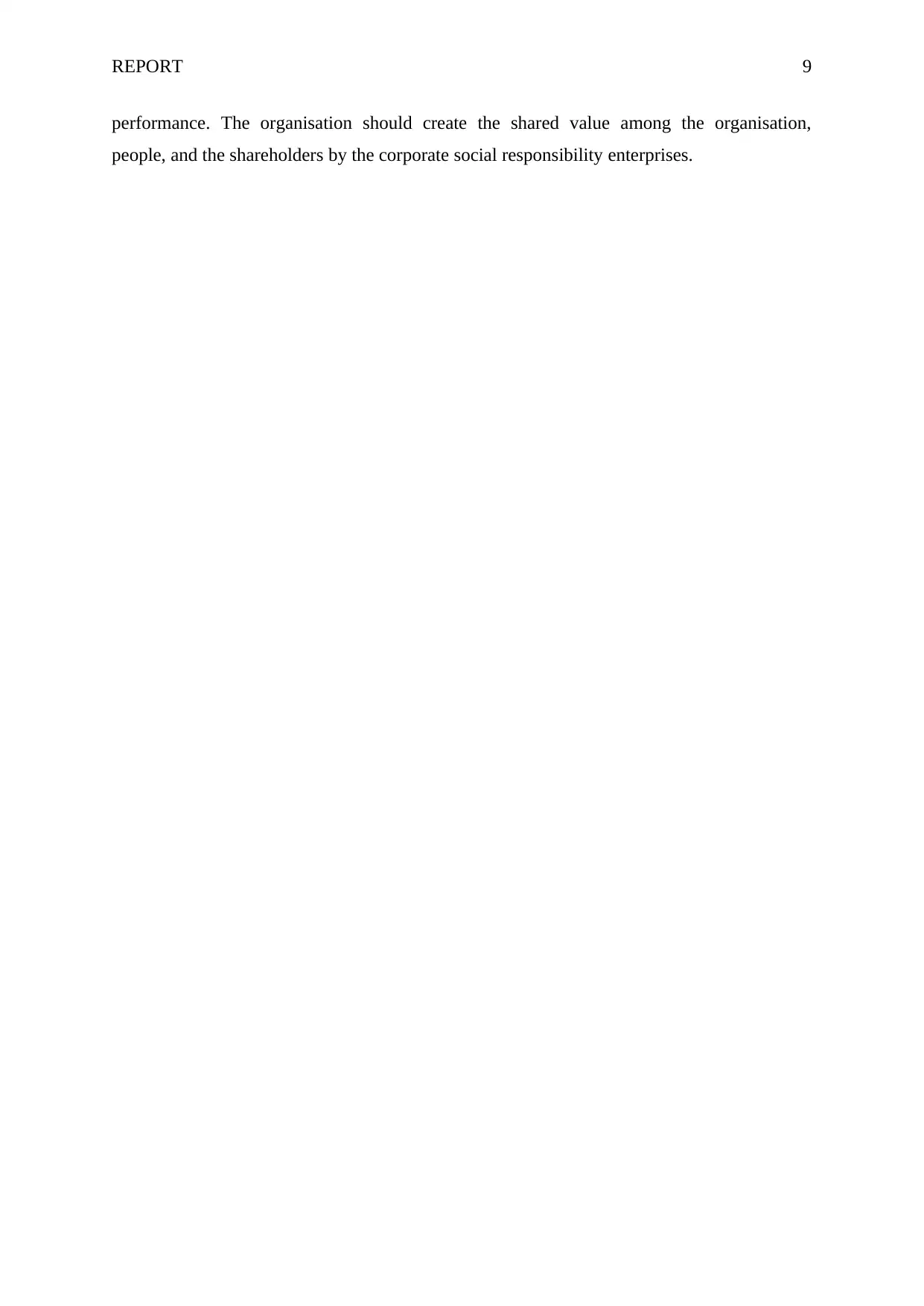
REPORT 9
performance. The organisation should create the shared value among the organisation,
people, and the shareholders by the corporate social responsibility enterprises.
performance. The organisation should create the shared value among the organisation,
people, and the shareholders by the corporate social responsibility enterprises.
Paraphrase This Document
Need a fresh take? Get an instant paraphrase of this document with our AI Paraphraser
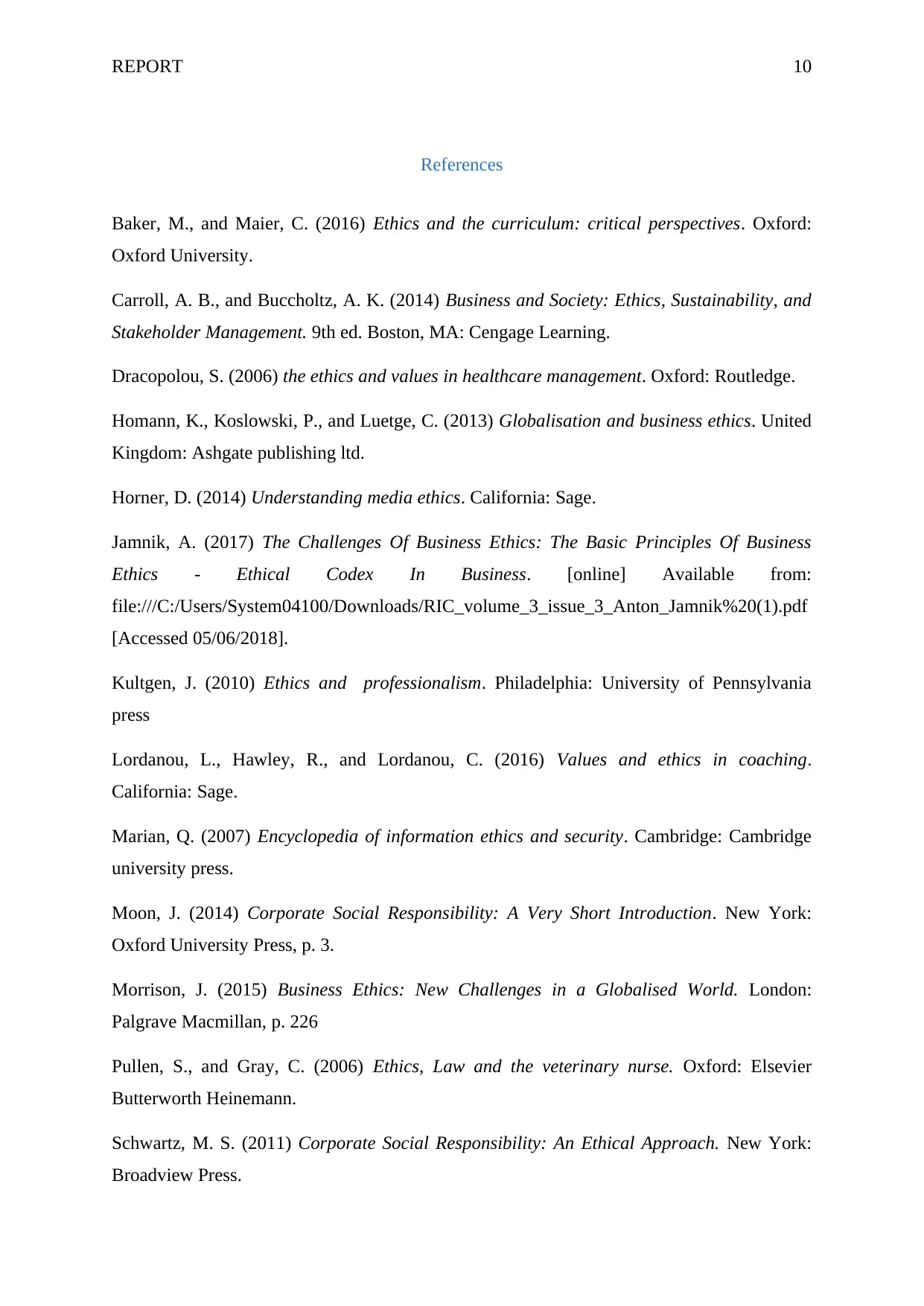
REPORT 10
References
Baker, M., and Maier, C. (2016) Ethics and the curriculum: critical perspectives. Oxford:
Oxford University.
Carroll, A. B., and Buccholtz, A. K. (2014) Business and Society: Ethics, Sustainability, and
Stakeholder Management. 9th ed. Boston, MA: Cengage Learning.
Dracopolou, S. (2006) the ethics and values in healthcare management. Oxford: Routledge.
Homann, K., Koslowski, P., and Luetge, C. (2013) Globalisation and business ethics. United
Kingdom: Ashgate publishing ltd.
Horner, D. (2014) Understanding media ethics. California: Sage.
Jamnik, A. (2017) The Challenges Of Business Ethics: The Basic Principles Of Business
Ethics - Ethical Codex In Business. [online] Available from:
file:///C:/Users/System04100/Downloads/RIC_volume_3_issue_3_Anton_Jamnik%20(1).pdf
[Accessed 05/06/2018].
Kultgen, J. (2010) Ethics and professionalism. Philadelphia: University of Pennsylvania
press
Lordanou, L., Hawley, R., and Lordanou, C. (2016) Values and ethics in coaching.
California: Sage.
Marian, Q. (2007) Encyclopedia of information ethics and security. Cambridge: Cambridge
university press.
Moon, J. (2014) Corporate Social Responsibility: A Very Short Introduction. New York:
Oxford University Press, p. 3.
Morrison, J. (2015) Business Ethics: New Challenges in a Globalised World. London:
Palgrave Macmillan, p. 226
Pullen, S., and Gray, C. (2006) Ethics, Law and the veterinary nurse. Oxford: Elsevier
Butterworth Heinemann.
Schwartz, M. S. (2011) Corporate Social Responsibility: An Ethical Approach. New York:
Broadview Press.
References
Baker, M., and Maier, C. (2016) Ethics and the curriculum: critical perspectives. Oxford:
Oxford University.
Carroll, A. B., and Buccholtz, A. K. (2014) Business and Society: Ethics, Sustainability, and
Stakeholder Management. 9th ed. Boston, MA: Cengage Learning.
Dracopolou, S. (2006) the ethics and values in healthcare management. Oxford: Routledge.
Homann, K., Koslowski, P., and Luetge, C. (2013) Globalisation and business ethics. United
Kingdom: Ashgate publishing ltd.
Horner, D. (2014) Understanding media ethics. California: Sage.
Jamnik, A. (2017) The Challenges Of Business Ethics: The Basic Principles Of Business
Ethics - Ethical Codex In Business. [online] Available from:
file:///C:/Users/System04100/Downloads/RIC_volume_3_issue_3_Anton_Jamnik%20(1).pdf
[Accessed 05/06/2018].
Kultgen, J. (2010) Ethics and professionalism. Philadelphia: University of Pennsylvania
press
Lordanou, L., Hawley, R., and Lordanou, C. (2016) Values and ethics in coaching.
California: Sage.
Marian, Q. (2007) Encyclopedia of information ethics and security. Cambridge: Cambridge
university press.
Moon, J. (2014) Corporate Social Responsibility: A Very Short Introduction. New York:
Oxford University Press, p. 3.
Morrison, J. (2015) Business Ethics: New Challenges in a Globalised World. London:
Palgrave Macmillan, p. 226
Pullen, S., and Gray, C. (2006) Ethics, Law and the veterinary nurse. Oxford: Elsevier
Butterworth Heinemann.
Schwartz, M. S. (2011) Corporate Social Responsibility: An Ethical Approach. New York:
Broadview Press.
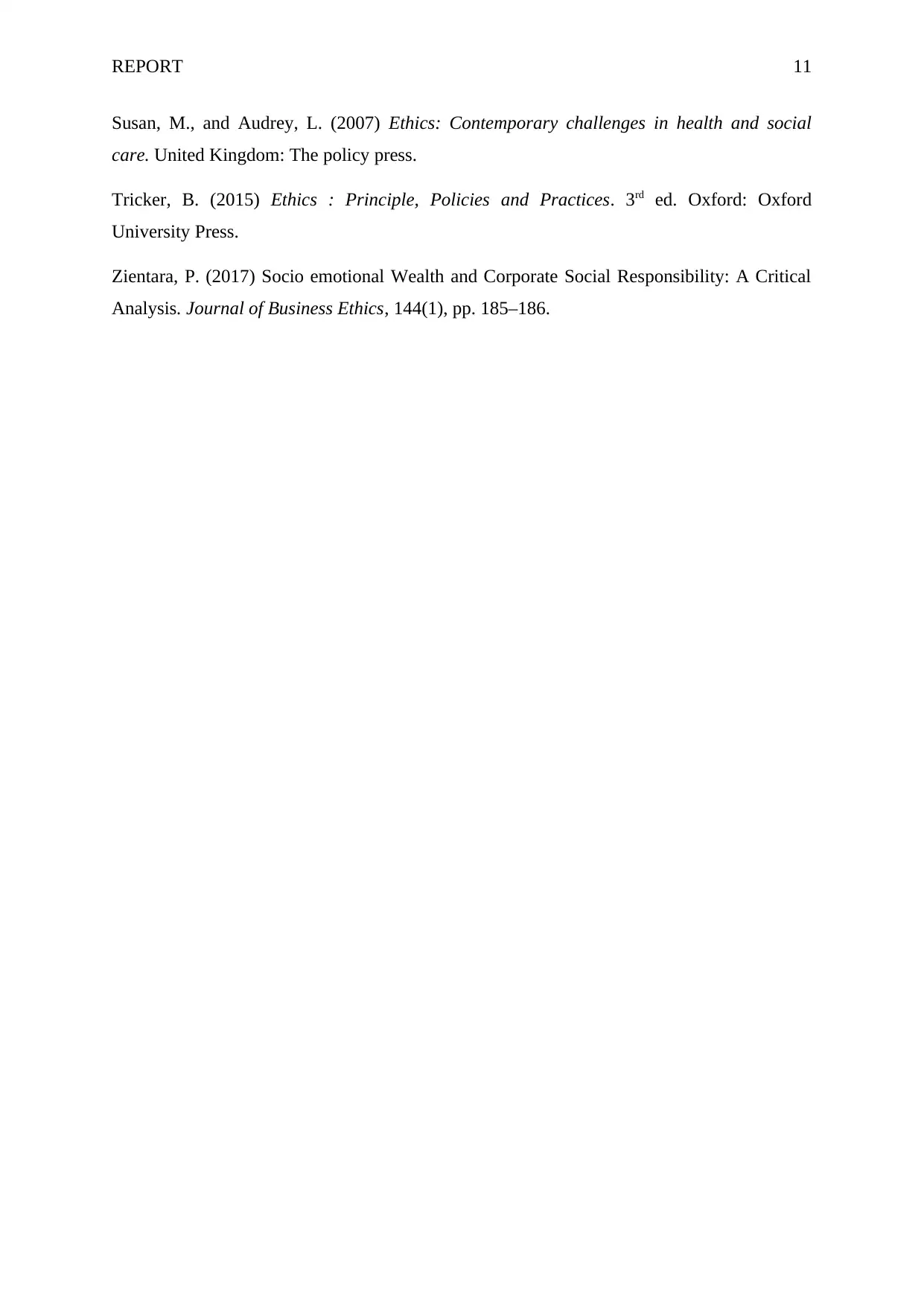
REPORT 11
Susan, M., and Audrey, L. (2007) Ethics: Contemporary challenges in health and social
care. United Kingdom: The policy press.
Tricker, B. (2015) Ethics : Principle, Policies and Practices. 3rd ed. Oxford: Oxford
University Press.
Zientara, P. (2017) Socio emotional Wealth and Corporate Social Responsibility: A Critical
Analysis. Journal of Business Ethics, 144(1), pp. 185–186.
Susan, M., and Audrey, L. (2007) Ethics: Contemporary challenges in health and social
care. United Kingdom: The policy press.
Tricker, B. (2015) Ethics : Principle, Policies and Practices. 3rd ed. Oxford: Oxford
University Press.
Zientara, P. (2017) Socio emotional Wealth and Corporate Social Responsibility: A Critical
Analysis. Journal of Business Ethics, 144(1), pp. 185–186.
⊘ This is a preview!⊘
Do you want full access?
Subscribe today to unlock all pages.

Trusted by 1+ million students worldwide
1 out of 13
Related Documents
Your All-in-One AI-Powered Toolkit for Academic Success.
+13062052269
info@desklib.com
Available 24*7 on WhatsApp / Email
![[object Object]](/_next/static/media/star-bottom.7253800d.svg)
Unlock your academic potential
Copyright © 2020–2026 A2Z Services. All Rights Reserved. Developed and managed by ZUCOL.




